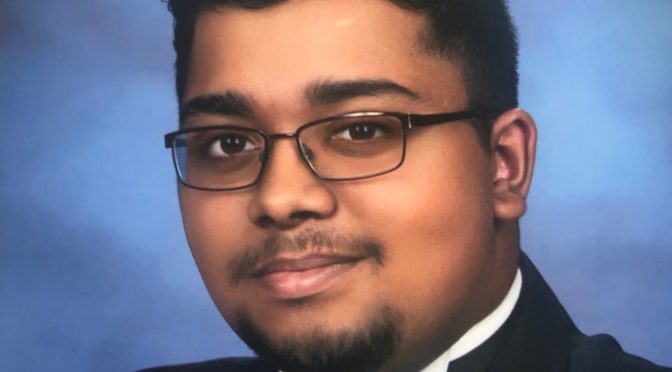On March 27, 2019 our lives were forever changed. We were devastated by the reckless and untimely death of our second child, Aaron Reddy, at the age of 18. Considering that marijuana is the drug that killed my child directly, the drug that was in his blood when he died, I am furious that our state just voted to legalize marijuana, without understanding its dangers. But now there is a growing group of parents whose children died from marijuana. We need to stand together, just like those whose kids died of opioids stand together. We will also make ourselves heard.
When cannabis becomes legal, its dangers intensify, as the experiences of Colorado and California prove. When medical marijuana becomes legal, its dangers intensified in Maryland, as the story of my son Aaron proves. Here is Aaron’s story.

Aaron was a intelligent, handsome young man, with a beautiful, compassionate, forgiving, self-sacrificing, quiet nature. He was accepting and loving of everyone. He had a quick wit and was always joking around with family and friends.
As he said a few weeks prior to his death, “Mom, we must always forgive everyone and spend time with those we love.” That was my Aaron, my precious kind boy. If only we had time with him now.
Thanksgiving was Aaron’s favorite holiday. He loved cooking; he loved food; he loved fellowship. No wonder he went to work in the food, restaurant business………….where all his dreams died.
How this nightmare began
We belong to the Indian community. My husband was born here, but I came over at age 7. I am an oncology nurse and my husband is a physical therapist. We don’t drink or do drugs. We literally learned of my son’s marijuana use within hours before he died. That was the day we found marijuana in his bedroom.

We just didn’t know that we should have suspected drugs. Many first-generation families also don’t know what goes on in American culture. For immigrant families, the drugs kill the American Dream.
When Aaron was 16 years old his friend from school helped him obtain a job as a busboy at a restaurant in Fallston, MD. Aaron was so excited about his interview. He dressed up in a suit, with his dad’s help, typed up a resume and obtained his first job. Little did I know that this was the beginning of the end of Aaron’s life. The woman who recommended to the manager that Aaron be hired had a long criminal history and had a plan to start a medical marijuana business in Maryland. She worked there as a waitress along with her son, daughter and stepson.
The mother knew that Aaron was a bright student in the business program at Eastern Tech Magnet H.S. He had dreams of becoming a Certified Management Accountant. From all the information we learned after Aaron’s death, we believe this family befriended and groomed Aaron to assist them with their criminal enterprise. They were making marijuana edibles and selling it through the restaurant. In addition, the restaurant workers who had medical marijuana cards sold high-potency honey, shatter, wax, budder to the other (younger) kids working there.
Should we have known more?
We started seeing changes in Aaron’s behavior a year or more before his death. He had a new group of work friends, became secretive, was always eager to go to work, avoided family activities and became more aggressive and despondent. However, I did not wake up to the real changes until it was too late! One day when I attempted to kiss his forehead while he was asleep on the family room couch, he jumped up and almost punched me in the face! Why was he suddenly so paranoid and prone to anger?
As I was running late to work, I thought about his behavior that whole day at work. While discussing this with someone at work, they informed me that Aaron was exhibiting all the signs of marijuana dependency as their own son had struggled with this addiction in the past.
The night Aaron died
He never came home the night of March 27, 2019. His impairment and addiction to marijuana caused him to veer off the road on his way home, crash into the woods off of I-95. There he got out of his car and walked onto I-95. A witness who saw my son at the scene said he was totally lost and confused, not in his right mind and not knowing what he was doing.
As he was waiting for his friend to pick him up, he was run over and killed by a 27-year-old with a previous history of marijuana possession and DUI while impaired by a controlled substance. I know Aaron wouldn’t have killed himself if he hadn’t been astronomically high. He had no intention to suicide. High levels of THC disoriented him to the extent that he lost touch with reality.
The police who responded to the accident scene never tested the 27-year-old for impairment of any kind, in spite of his history, based on the investigative reports that we obtained. In addition, despite numerous statements in the police report of the strong odor of marijuana emitting from Aaron’s car, they called his manner of death a suicide, never testing his blood for THC.
Getting the correct toxicology results came later
One week after Aaron’s death we were able to pick up his belongings from the towing company’s lot, where his totaled car was held. The overpowering smell of marijuana was so strong that we had to take turns retrieving Aaron’s possessions from his car. We called the Medical Examiner’s office to find out the results of the toxicology report.
Surprisingly, the toxicology report did not include the results for marijuana testing. Marijuana testing should be automatic. We described the strong smell of marijuana emitting from Aaron’s car a week after his death. Then we pressed for the medical examiner to retest Aaron’s blood for THC.
The revised results came back quite high for THC, including Delta-9 THC and Delta-9 THC Carboxy. There was no alcohol or other drugs. From sharing his results with cannabis experts, they determined that he was “acutely intoxicated + showed signs of long-term use.”
Subtle change; why did this deception occur?
Now we know that Aaron was dabbing marijuana. Dabs are intensely strong and odorless. Why is it so different? The THC that is extracted from the plant is nearly pure, approximately 77% THC or higher! Then butane torch is used to heat the crystals or oil in a vaping device or homemade bong to breathe in the fumes. This can keep a person high for up to 4 days.
The drug-dealing family at the restaurant used Aaron to apply for their medical marijuana license. They wanted him to help them start a business, using his business skills. They already worked in the illegal marijuana business, selling edibles, but had moved in from another state without medical marijuana.
My daughter knew about his use before us
While talking with my daughter, I found out that she had known of Aaron’s marijuana use but did not inform us because of what she had been taught at school. She attends Perry Hall H.S. The school, without informed consent of parents, had a general assembly for the science students with a guest speaker. The guest speaker was a bone marrow transplant patient who used medical marijuana; she was there to inform the teens of the benefits of this federally-illicit Schedule I drug.
The patient apparently informed the teens that it was just “an herb from an ancient plant that helped ease her pain, anxiety and depression.” I was astonished at this propaganda, since my cancer patients who use marijuana have much worse outcomes than non-users.
I was shocked that the school would allow the marijuana industry into our schools. The ramifications of this misinformation contributed to the death of my son. I believe that, if my daughter and son had been provided with the truth about this biphasic drug and not been fed blatant lies about marijuana, my son would be alive at this time.

Aaron’s Law
I would like to propose a bill, called Aaron’s Law, with the following:
First, Maryland does not have a legal definition of the parameters for marijuana intoxication. Most states have a legal limit of 5 ng/ml to prevent people from driving under the influence of marijuana, although many experts say this is too high.
Secondly, no public school district should allow the marijuana industry into our schools to lobby and promote this illicit drug.
Third, all traffic deaths should require testing of all parties for multiple substances, including THC. Maryland is set to have a devastating number of crashes after legalization, if the state doesn’t start testing for marijuana when there are crashes that cause injury or death. It’s not enough to stop the testing at alcohol, because marijuana added to alcohol makes the impairment so much worse.
Fourth, if schools are drug-free, shouldn’t our places of work be drug-free too? Especially restaurants, where people who make our food for consumption shouldn’t be under the influence of any mind-altering drug.
By Anita Reddy, Maryland

